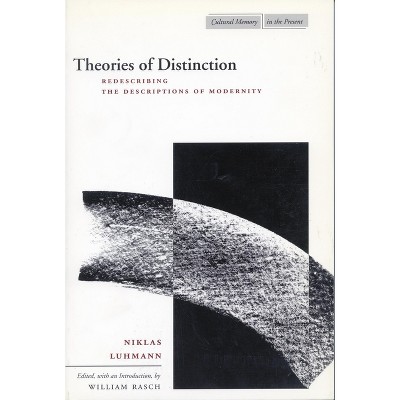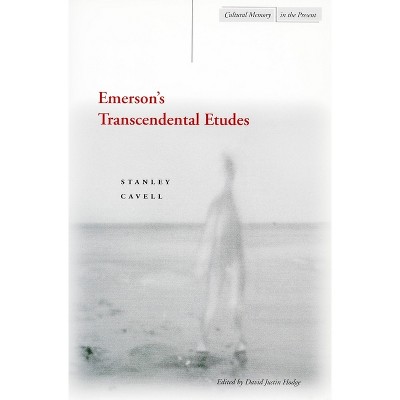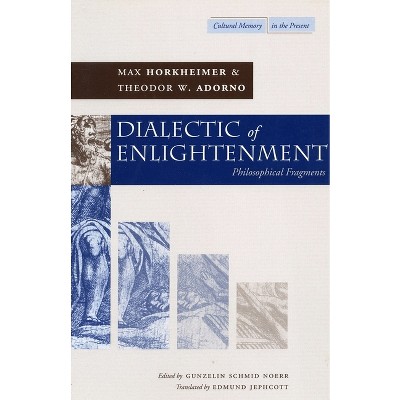Dead Time - (Cultural Memory in the Present) by Elissa Marder (Hardcover)

About this item
Highlights
- This book explores how modernity gives rise to temporal disorders when time cannot be assimilated and integrated into the realm of lived experience.
- About the Author: Elissa Marder is Associate Professor of French at Emory University
- 240 Pages
- Literary Criticism, Poetry
- Series Name: Cultural Memory in the Present
Description
About the Book
This book explores how modernity gives rise to temporal disorders when time cannot be assimilated and integrated into the realm of lived experience. It turns to Baudelaire and Flaubert in order to derive insights into the many temporal disorders (such as trauma, addiction, and fetishism) that pervade contemporary culture.Book Synopsis
This book explores how modernity gives rise to temporal disorders when time cannot be assimilated and integrated into the realm of lived experience. Inspired by Walter Benjamin's description of the shock experience of modernity through readings of Baudelaire, the book turns to Baudelaire and Flaubert in order to derive insights into the many temporal disorders (such as trauma, addiction, and fetishism) that pervade contemporary culture.
Through close readings of Baudelaire's Flowers of Evil and Flaubert's Madame Bovary, Elissa Marder argues that these nineteenth-century texts can, paradoxically, make us aware of aspects of present-day life that are not easily described or perceived. Following reflections by Benjamin, Jameson, and Lyotard, she shows that the ability to measure time increases in inverse proportion to the human ability to express it and create meaning through it. Although we have increased our ability to record events, we have become collectively less able to assimilate the experience of the very events that new technologies enable us to record. The literary articulations of addiction and fetishism in Baudelaire and Flaubert reveal that these temporal disorders can be understood structurally as expressions of an inability to live in time. At a psychic level, they can be read as attempts to ward off increased stimuli and unwanted aspects of reality by stopping time.
The book also interrogates the relationship between misogyny and modernity. By revealing the privileged function assigned to feminine figures in Baudelaire and Flaubert, and engaging with contemporary writings in psychoanalysis, feminism, and cultural studies, this work shows how the experience of time--and the attempts to stop it--become inscribed on a feminine or feminized body. Dead Time provides us with a way of understanding how our own collective temporal disorders may be part of the unassimilated legacy of nineteenth-century modernity.
From the Back Cover
This book explores how modernity gives rise to temporal disorders when time cannot be assimilated and integrated into the realm of lived experience. Inspired by Walter Benjamin's description of the shock experience of modernity through readings of Baudelaire, the book turns to Baudelaire and Flaubert in order to derive insights into the many temporal disorders (such as trauma, addiction, and fetishism) that pervade contemporary culture.Through close readings of Baudelaire's Flowers of Evil and Flaubert's Madame Bovary, Elissa Marder argues that these nineteenth-century texts can, paradoxically, make us aware of aspects of present-day life that are not easily described or perceived. Following reflections by Benjamin, Jameson, and Lyotard, she shows that the ability to measure time increases in inverse proportion to the human ability to express it and create meaning through it. Although we have increased our ability to record events, we have become collectively less able to assimilate the experience of the very events that new technologies enable us to record. The literary articulations of addiction and fetishism in Baudelaire and Flaubert reveal that these temporal disorders can be understood structurally as expressions of an inability to live in time. At a psychic level, they can be read as attempts to ward off increased stimuli and unwanted aspects of reality by stopping time.
The book also interrogates the relationship between misogyny and modernity. By revealing the privileged function assigned to feminine figures in Baudelaire and Flaubert, and engaging with contemporary writings in psychoanalysis, feminism, and cultural studies, this work shows how the experience of time--and the attempts to stop it--become inscribed on a feminine or feminized body. Dead Time provides us with a way of understanding how our own collective temporal disorders may be part of the unassimilated legacy of nineteenth-century modernity.
Review Quotes
Dead Time
"This book is stunning in its ability to range widely and effectively over some of the most important, contested, and misunderstood regions of contemporary literary and cultural theory. A major and most welcome contribution to the study of two great canonical French authors, it is also a subtle but cogent intervention in the ongoing attempt to define and theorize a relation between the catchall concepts 'modernism' and 'postmodernism.'"--Kevin Newmark, Boston College
About the Author
Elissa Marder is Associate Professor of French at Emory University




